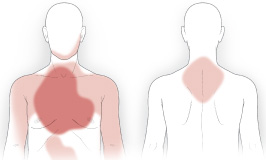
Your aorta comes in an arch forward and then goes down your back. The patient feels a pressure or squeezing pain behind the breast bone.

Often the result of a panic attack or heightened reaction chest pain is a concern because of.
Heart and chest pain. Chest pain and heart attack symptoms. Chest pain is only one of the possible signs of an impending heart attack. If you notice one or more of the signs below in yourself or someone else call 911 or your local emergency number right away.
Uncomfortable pressure squeezing fullness burning tightness or pain in the center of the chest. Angina is chest pain or discomfort caused when your heart muscle doesnt get enough oxygen-rich blood. It may feel like pressure or squeezing in your chest.
The discomfort also can occur in your shoulders arms neck jaw or back. Look beyond chest pain symptoms When you have a heart attack its because one of the coronary arteries that provide blood to the heart is blocked. The blockage obstructs the flow of blood and oxygen to the heart.
When you think of a heart attack you may picture a person clutching their chest and collapsing from sudden severe pain. Something like an aortic dissection typically presents with chest pain thats underneath the sternum where your heart is located but also very characteristic like a tearing or knife-like pain in the back. Your aorta comes in an arch forward and then goes down your back.
Cardiac chest pain in this context is considered as any pain attributed to ischemia oxygen deprivation to the heart muscle. This must be taken very seriously as it can progress to an infarct death of heart muscle tissue without prompt and appropriate treatment. Heart attack myocardial infarction.
As an example chest pain is sometimes a symptom of anxiety. Often the result of a panic attack or heightened reaction chest pain is a concern because of. According to information published on PubMed Health the most common symptom of coronary heart disease is chest pain in the heart area.
This type of heart pain can feel like squeezing pains in the chest that spread to your arm. Your heart may start to hurt after physical exertion or it may come on suddenly. Non-cardiac chest pain is often described as feeling like angina the chest pain caused by heart disease.
The patient feels a pressure or squeezing pain behind the breast bone. Some people also report the pain spreads to the neck left arm or back. The pain can last for a few minutes or for hours.
Anxiety may be best known for its mental symptoms but its often the physical symptoms that cause the most distress. One of the most frightening anxiety symptoms is chest pain. Thats because chest pain is associated with serious heart problems leading many to worry about their health.
New-onset chest pain is almost always a concerning symptom and a person should not ignore it. If they experience chest pain they should seek emergency medical attention. Heart attack and chest pain Typical heart attack pain is similar to the pain of coronary artery disease.
A heaviness tightness or pressure. A heart attack requires immediate emergency care. The heart is only one organ in the chest.
Other body parts located in the chest area include muscles bones connective tissues nerves skin the lungs the aorta a major artery the esophagus and the stomach. These can all cause chest pain. The most common heart problems that cause chest pain include.
Pericarditis which usually causes a sudden sharp stabbing pain that gets worse when you breathe deeply or lie down. Angina or a heart attack which have similar symptoms but a heart attack is life-threatening.